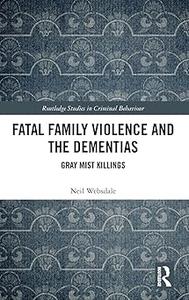
Free Download Neil Websdale, "Fatal Family Violence and the Dementias "
English | ISBN: 1032368071 | 2024 | 252 pages | EPUB, PDF | 894 KB + 15 MB
This book explores dementia-related aggression, violence, and homicide through a detailed analysis of "gray mist killings." The term gray mist killing refers to intimate partner homicides (IPHs) committed by spouses/partners suffering from dementia, homicides of dementia sufferers committed by their caregiving spouses/partners or other family members, and IPHs attributable to the complications of caring for a co-resident family member suffering from dementia.
Killings by people with dementia raise questions about the role of biological, psychological, and sociological forces. This book therefore encourages discussions around the relative weighting of these interrelated forces, and why the criminal justice system and the courts have a hard time handling these killings. It also adds to our understanding of the social responses to people with dementia, the orchestration of services, the nature of caring, and the interaction between sufferers and those familial, community, and state actors that provide support and care. The vividly detailed case studies (from the US, UK and Australia) uniquely inform criminological debates about violence, homicide, and the social responses to these complex phenomena. They are organized around the apparent motives for the killing, such as mercy, theft, prior intimate partner violence, mental illness, and exhaustion. The social responses of families, communities, and state actors are examined and contextualized against what researchers and dementia specialists suggest are promising or best practices for intervention. Apparent triggers or circumstantial precipitants for the killings invite discussion of signals, risks, and preventive interventions. The book culminates in an attempt to make sense of gray mist killings, as well as a discussion of broader implications and significance in relation to globalization, violence against women, the rising prevalence of the dementias, declining birthrates, climate change, and sustainable economic development.
Read more
